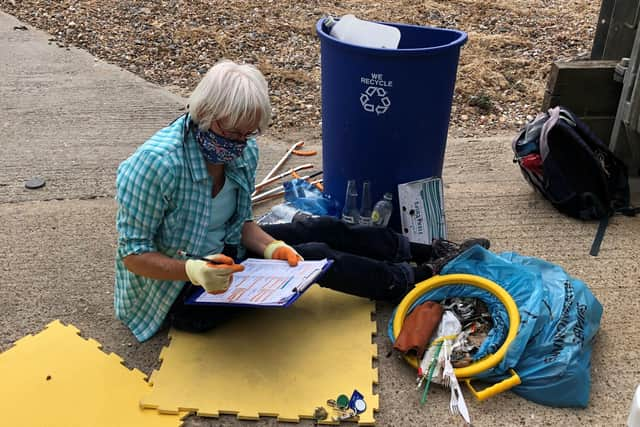Shocked volunteers find ‘depressing’ heaps of rubbish on Worthing beach
and live on Freeview channel 276
Ecologist Dr Barbara Pilley Shaw, who has organised the event for the past ten years, said this year’s beach litter survey was smaller than previous years, due to Covid-19 restrictions, but the results were significant.
Only one of the two regular 100m beach surveys took place by Worthing Pier, and this thanks to Worthing Borough Council.
Advertisement
Hide AdAdvertisement
Hide AdBarbara said: “Amanda, a coastal warden, and I analysed our findings, much down on previous years, but with significant trends.


“Covid plastic litter was evident as a disposable mask and two gloves. Little trash came in on the tide but there were numbers of nicotine-containing cellulose acetate cigarette filters stubbed into wooden groynes, or caught in a natural strandline full of tangled seaweed and mermaids’ purses, the empty egg cases of Thornback Rays and Dogfish.
“The most shocking findings were socially-distanced piles of discarded fast food picnics on the upper shore – large plastic bags, big cardboard fish and chips cartons, wipes, wooden cutlery, beer cans and large plastic bottles half full of carbonated drinks.
“These depressing heaps add to the daily workload of environmental services working along the foreshore. If attitudes don’t change, we will further lose local biodiversity and fish stocks and it will be a lamentable fact of life that we simply can’t have our fish & chips and eat it.”
Advertisement
Hide AdAdvertisement
Hide AdWorthing’s results will be collated with others, analysed and interpreted by the Marine Conservation Society.
Barbara said: “We know that conservation of the marine environment, with the ecosystem services it provides, is essential for climate regulation and food supply.
“Reducing carbon emissions from fossil fuels and pollution-busting the mountains of plastic waste from their derivatives, is ever more pressing.
“Thirty years ago, after stormy high tides, Worthing beach was knee-deep in stinky rotting seaweed. Nowadays, clearer sandy and shingly beaches seem more attractive to trippers and tourists and to anglers and water sports enthusiasts, but there has been a high price to pay.
Advertisement
Hide AdAdvertisement
Hide Ad“Brown seaweeds, or kelp, no longer form a wonderfully abundant biodiverse forest along the West Sussex coast, persisting only as tiny patches. Some of this habitat loss can be attributed to unsustainable fishing practices but also to acidic pollution of the oceans and to plastic littering the seas.
“The Sussex Wildlife Trust champions Marine Conservation Zones. These form nine areas off the Sussex coast, cover 22 per cent of our seas and safeguard biodiversity and future fishing stocks.
“SWT Sea Search and Shore Search Citizen Science projects engage volunteers in recording marine wildlife, helping to gauge the ongoing state of our very special and varied Sussex coastal habitats.”
A message from the Editor, Gary Shipton:
In order for us to continue to provide high quality and trusted local news, I am asking you to please purchase a copy of our newspapers.
Advertisement
Hide AdAdvertisement
Hide AdWith the coronavirus lockdown having a major impact on many of our local valued advertisers - and consequently the advertising that we receive - we are more reliant than ever on you helping us to provide you with news and information by buying a copy of our newspapers.
Our journalists are highly trained and our content is independently regulated by IPSO to some of the most rigorous standards in the world. But being your eyes and ears comes at a price. So we need your support more than ever to buy our newspapers during this crisis.
Stay safe, and best wishes.